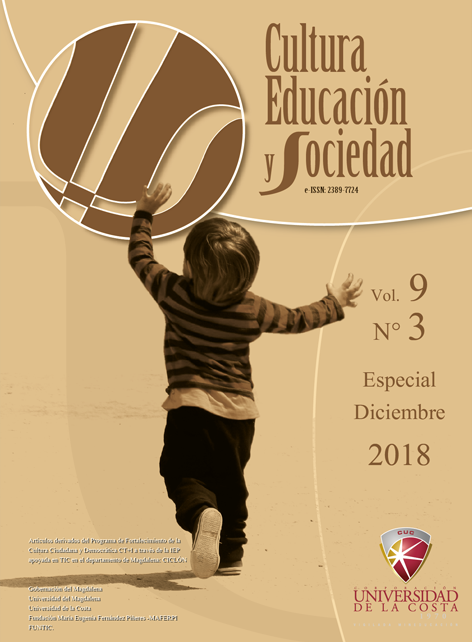Culture and musical intelligence through research as a pedagogical strategy in basic education
DOI:
https://doi.org/10.17981/cultedusoc.9.3.2018.96Keywords:
Culture, musical intelligence, IEP.Abstract
The education has presented significant changes in the last years so from the teaching role it is necessary to implement dynamic strategies that are oriented to improve the students' competences, favoring the teaching-learning process. The objective of the study was to promote culture and musical intelligence through Research as a Pedagogical Strategy (IEP) in basic education. With a qualitative methodological design under the participatory action research (IAP) model, the data collection techniques used were the participant observation and the field diary. Regarding the beneficiary population, a stratified random sampling was carried out, using as an inclusion criterion the interest for culture, music and research, the sample consisted of one hundred (100) students with ages between six (6) and twelve (12) years, of all the primary levels of the IED Francisco de Paula Santander located in the Municipality of Magdalena Foundation. The results showed that through the culture and musical intelligence techniques are carried out that reinforce the memory, cognitive tasks for the learning, ways to solve the communicative problems, as well as activities that allow an assimilation of the contents in an efficient way, thanks to the creation of a favorable environment, companionship and cooperation among students.
Downloads
References
Araque, F. y Suárez, O. (2017). Equidad Ética-Jurídica de la Ciencia, para la Emancipación del Conocimiento y los Saberes. JURÍDICAS CUC, vol. 13, no. 1, pp. 97-120. DOI: http://dx.doi. org/10.17981/juridcuc.13.1.2017.5
Bravo, H. (2008). Estrategias pedagógicas. Córdoba. Universidad del Sinú.
Calderón, A. (2015). La música como estrategia dinamizadora para facilitar los procesos de aprendizaje en la educación inicial.
Cochran, M., y Lytle, S. (2003). “Más allá de la certidumbre: Adoptar una actitud indagadora sobre la práctica”. En: A. M. Liberman, J. L. Miller (Eds.). La indagación como base de la formación del profesorado y la mejora de la educación. Barcelona: Octaedro.
Cortacáns, C., & Almudena, M. (2011). Inteligencias múltiples en acción, Colegio Montserrat, Barcelona.
De Souza, J. F. (2001). Recife: Edições Bagaço.
Hernández, R., Fernández, C., & Baptista, P. (2010). Metodología de la investigación. México. Editorial Mc Graw Hill.
Mejía, M., y Manjarrés M. (2010). Las pedagogías fundadas en la investigación. Búsquedas en la reconfiguración de la educación. Revista Internacional Magisterio 42: 16-26. Colombia.
Mejía, M. (2011). Las escuelas de la globalización. El conflicto por su reconfiguración. Bogotá: Desde Abajo.
Mignolo, W. (2003). Capitalismo y geopolítica del conocimiento. Buenos Aires: Paidós.
Ortega, P. P. (2009). Sujetos y prácticas de la pedagogía crítica. Bogotá: El Búho.
Pascual, P. (2002) Didáctica de la música para primaria. Capítulo 6: El método Kodaly.
Segura, E. (2016). Información, estabilidad y complejidad de aprendizaje en memorias asociativas. International Journal of Management Sciences and Operations Research, 1(1), 49-53. Recuperado a partir de http://ijmsoridi.com/index.php/ijmsor/article/view/77
Torres, A. (2007). La educación popular. Trayectoria y actualidad. Bogotá: El Búho.
Torres, L. (2004) Tres enfoques teórico-práctico. México: Trillas.
Waichman, A. (2000) Herramientas de pensamiento. España: Siglo XXI.
Downloads
Published
How to Cite
Issue
Section
License
Copyright (c) 2018 CULTURA EDUCACIÓN Y SOCIEDAD

This work is licensed under a Creative Commons Attribution-NonCommercial-NoDerivatives 4.0 International License.
![]()
Creative Commons 2020 CULTURA EDUCACIÓN Y SOCIEDAD
This article is under international license Creative Commons Reconocimiento-NoComercial-SinObrasDerivadas 4.0.
The published articles are the sole responsibility of their authors and do not necessarily reflect the opinions of the editorial committee.
CULTURA EDUCACIÓN Y SOCIEDAD respects the moral rights of its authors, who assign to the editorial committee the patrimonial rights of the published material. In turn, the authors inform that this work is unpublished and has not been previously published.
All articles are under a:
Licencia Creative Commons Atribución-NoComercial-SinDerivadas 4.0 Internacional.
![]()


 English
English
 Español (España)
Español (España)




_12.53_.27_p_. m_._3.png)





_12.57_.35_p_. m_._3.png)
_12.50_.37_p_. m_._3.png)



